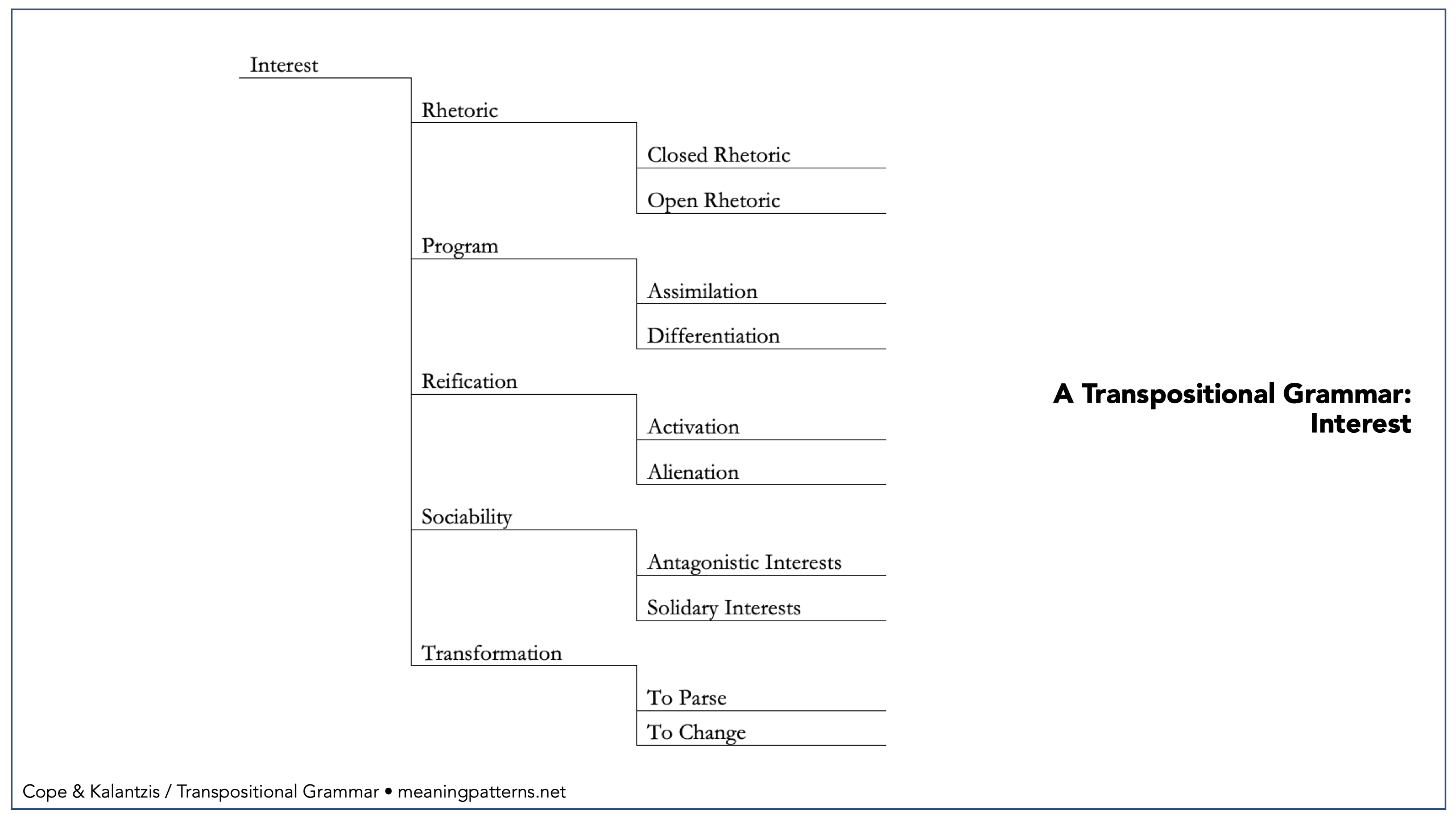Interest
Interest refers to the purposes participants in meaning bring from their context of meaning to each situation of meaning; and the meaning-work that participants do to negotiate their inevitable differences. The interests of participants in meaning are never simply shared. Perhaps the not-sharing is in small ways. Or the differences may be major in the case of fundamental misunderstandings. The non-alignment can at times be gross. Sometimes the differences are mutually beneficial. Other times, the one interest can be at the expense of the other. We classify the negotiation of differential interests in the processes of meaning into several kinds of appeal: rhetorical, programmatic, reifying, sociable, and transformative.

Rhetoric
Rhetoric is an appeal to differential interests in negotiation among participants in representation, communication and interpretation. The ground of meaning is a not a place of architected, in-common sameness. It is a common ground where differences meet—innocently or benevolently at some times, not so innocently or maliciously at others. Messaging purports, impossibly, to be transmission and communion. Rhetoric, in contrast, is an appeal based, for better and sometimes for worse, in differential interests. In their rhetorical play, some differences of interest may be complementary and generative—we will call this “productive diversity.” But equally, the result may be in other moments of rhetorical interaction be what Habermas calls “distorted communication.” Closed rhetoric sets out to limit the scope for meaning of interpreters, to enforce a narrow range of meaning in interpretation. Open rhetoric anticipates the possibility of differences in interpretation, making space for alternatives.
Program
Communication can be oriented to different programs, whether these be to assimilate or to differentiate. Hear what I say! Think as I think! These are typical appeals in program of assimilation. Some assimilative programs may insist on conformity to the detriment of established lifeworlds; others may be to demand equality and rights. An alternative orientation is to differentiate, recognizing and perhaps accentuating differences in meaning, for better perhaps in a culture of civic pluralism, or for worse in a state of divide and rule. Assimilation involves the negotiation of differential interests in programs where it is anticipated that the message receiver will come over to the message sender’s expression of interest. Differentiation, by contrast, entails the negotiation of differential interests in programs where the message receiver’s interest is recognized, and the message is differentiated.
Reification
Reification occurs in processes of transposition by means of which social meanings are presented (activation) and distorted or concealed (alienation) by their objectification, differentially serving interests. It is a process of making things to seem inevitably so, ineluctably so, always-obviously so. Then, paradoxically, for their overwhelming self-evidence their underlying meanings become hard to see or disappear from view. As a consequence, such states of affairs seem impervious to redesign, less obviously designs in the sense of having been made to serve one interest or another. Mostly, this works in favor of the status quo, and so the differential interests of the powers-that-be.
Sociability
In the meeting of differential interests, sociability is the measure of our participation. Sociability can be innocently complementary, or antagonistic, and when antagonistic, explicitly or implicitly so. The patterns of sociability are not always obvious. However, any momentary occlusions are always ready to be revealed for what they are. Meanings that are hidden, meanings surreptitiously or not-so surreptitiously favoring some interests at the expense of others, can always be exposed. In a transpositional grammar, so can the manner of their hiding. Antagonism is exposed in the meeting of differential interests, frequently enacted by compulsion, explicitly or by means of deception. Solidary interests are manifest in the meeting of differential interests where meanings are achieved voluntarily and where transparency would not change the meaning. Participation in meaning happens because across differential interests, there is a need to know, a need for help, a need to share, and any number of other complementary interests that are the stuff of sociability
Transformation
Meaning, invariably, is a matter of design. We are always (re)making the world, materially or in the ideal. And, for the remaking, redesigns can never quite be the same. To mean is to transform. But there is design and design. Some designs replicate the world in this sense: their transformations do nothing to change the configuration of interests. Transformation refers to the changes that occur in the world as a consequence of meaning, where the configuration of interests may in some circumstances may remain essentially the same (replication), where they are changed in small ways (hacks of recognition or redistribution), or where fundamental changes are effected in patterns of meaning (revolution).
Reference: Kalantzis, Mary and Bill Cope, 2020, Adding Sense: Context and Interest in a Grammar of Multimodal Meaning, Cambridge UK: Cambridge University Press, pp. 189-90.
